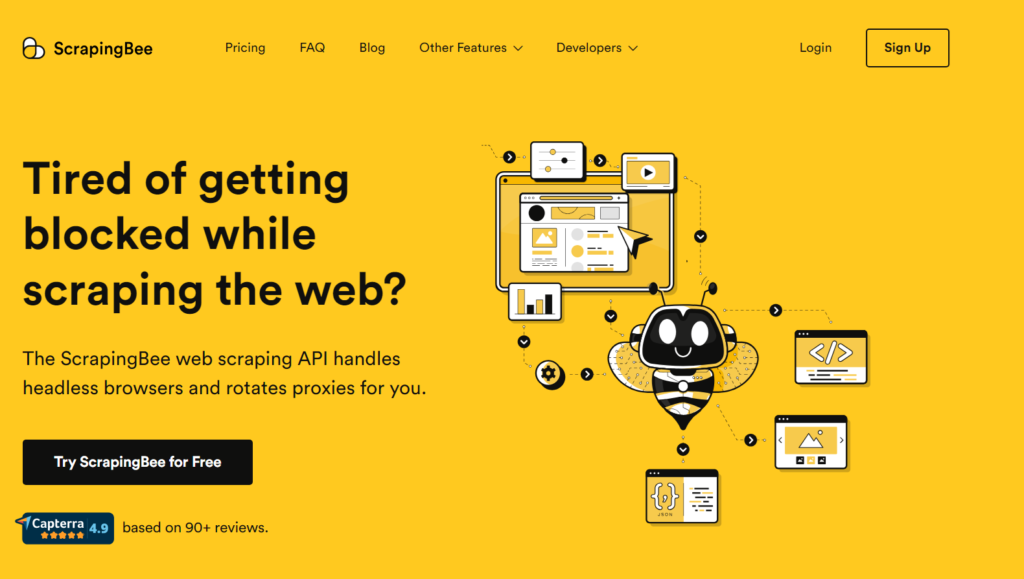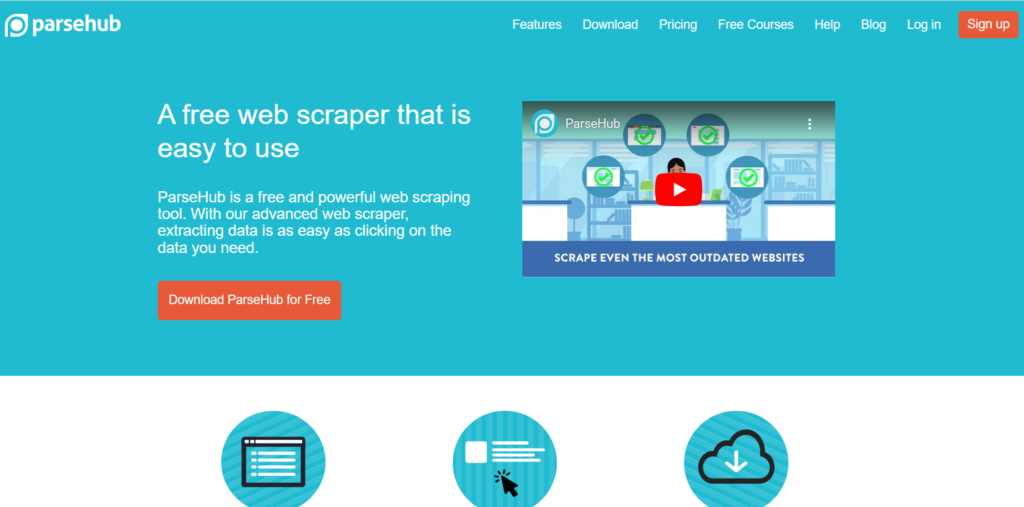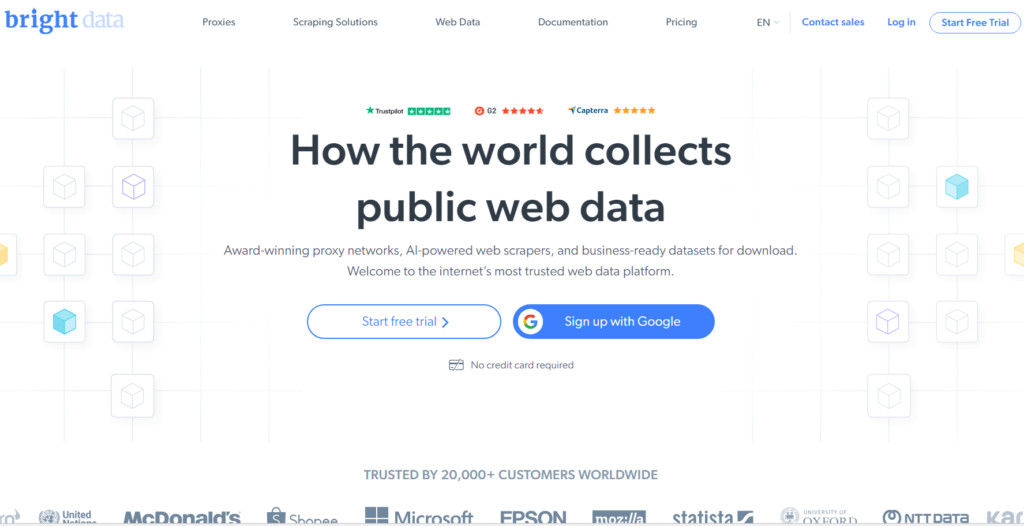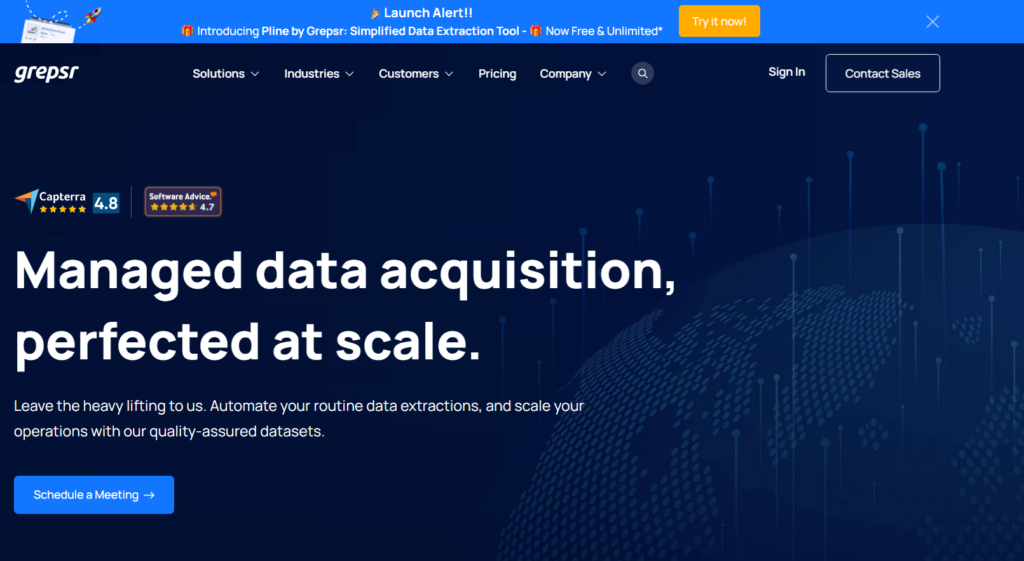With the current developments underpinning today’s data-driven world, businesses and researchers are consistently seeking the right methods to extract valuable information from the vastness of the internet. AI data scraping tools have now been developed, with wide functionalities for large-scale acquisition, processing, and analysis of online data. In this article, a general concept of AI data scraping and a masterly list of top-15 AI data scraping tools that are changing the field are shown.
What is AI Data Scraping?
AI Data Scraping Tools are the act of extracting information from websites using artificial intelligence and machine learning to do so in an automated manner. In stark contrast to the conventional ways of web scraping, AI data scraping tools can adapt themselves to the ever-changing web structures, identify patterns, and deliver in-depth capacities of complex data extraction with little human intervention.
Types of AI Data Extraction Tools
1. Browser Extensions
Web scraping applications that extend the functionalities of the browser so that the user may be able to extract information from currently visited web pages. They are mostly user-friendly and require minimal setup efforts.
Example: Octoparse Browser Extension
2. Cloud-Based AI-Scraping Platforms
Ever-scalable solutions, available for all, solve large-scale extraction problems. The latter kind of tool is usually feature-rich, and one can access it from several internet access points.
Example: Import.io
3. API-Based Services
API-based scraping services give developers programmatic access to AI data extraction capabilities. The services can be easily integrated into existing applications and workflows.
Example: Diffbot
4. Desktop Applications
Tools for desktops are the most powerful AI scraping applications, and they often provide the most control over the scraping process to their users. These applications can be perfect for the user who values local data processing and storage.
Example: Parsehub
5. Headless Browser Solutions
The headless browser tools use AI in the simulation of web browsers but without any graphical user interface so that it can be used in the extraction of data. This is a solution for how to scrape data faster and in a more time-saving manner from JavaScript-heavy websites.
Example: Puppeteer
Why AI Data Scraping Tools Are Important
1. Efficiency and Speed
AI-equipped scraping tools can handle and extract data from thousands of web pages in a fragment of the time taken by any human to do so. This exponential rise in the efficiency factor allows smooth data extraction by businesses to garner vast datasets within small periods and, hence, be in a position to react to market variations and make time-critical decisions.
2. Accuracy and Reliability
Human error is an inevitable part of manual data collection; it grows more so when the volume of information becomes huge. AI data scraping tools get rid of this problem through the application of predefined rules and patterns consistently for the extraction of data. Machine learning algorithms can self-improve their accuracy with time through “learnings” from previous scraping tasks.
3. Handling Complex Data Structures
Because most modern websites are designed with complex layout structures and dynamic content, this makes it difficult for classic tools to scrape such websites. AI Data Scraping Tools are flexible and adaptive to such complexities by trying to understand context and structure to extract data accurately — even from JavaScript-rendered pages or behind login walls.
4. Cost-Effective Data Collection
Manual data collection from websites requires a team and is not only time-consuming but also expensive. AI data scraping tools facilitate very inexpensive data collection, thus saving a great deal of the cost associated with it and permitting a business to deploy its resources more effectively in the business cycle.
5. Real-Time Data Updates
In fast-changing industries, time for the latest information is everything. AI Data Scraping Tools can be programmed to monitor and extract data from target websites continually, making sure that businesses always have the latest information at their disposal.
How to Choose AI Data Scraping Tools
Getting the right AI data scraping tool is a consideration that will make your data collection projects successful. Key considerations when selecting a web scraping tool include the following:
1. Ease of use
Consider your technical team’s expertise. Some may come with friendly interfaces good enough for non-technical people, while others can require a good amount of programming knowledge.
2. Scalability
Ensure the tool can handle your current data needs and scale as your requirements grow. Look for features like concurrent scraping and distributed processing.
3. Data Quality and Cleaning
Go for a tool that does not only extract data but includes features in cleaning, normalizing, and validating the data for quality output.
4. Supported Data Formats
Check if the software will be able to extract data and support file formats like CSV, and JSON, or directly integrate with your database.
5. Handling of Dynamic Content
If it’s necessary to make web scraping from sites rendered by JavaScript, the chosen tool must have the right way to handle dynamic content.
Top 15 AI Data Scraping Tools
1. ScrapingB

Scraping Bee is a solid best AI web scraper API based on artificial intelligence. It allows developers to concentrate on data analysis, handling proxy management, browser rendering, and solving CAPTCHAs.
It has an intelligent system of automatically rotating IP addresses and user agents to avoid detection and blocking. Versatility, in this respect, comes from the fact that the setup of the service works with both static websites and JavaScript-rendered websites in general.
Key Features:
- Automatic proxy rotation and management
- JavaScript rendering capabilities
- CAPTCHA handling
- Geotargeting options
Pros:
- Easy integration through any API
- Infrastructure scaling to handle a large number of tasks
- Strong anti-blocking
Cons:
- Implementation of APIs can be difficult
- Lacks big controls of proxy settings
- High pricing for infrastructures where high scraping is needed
Price: Starts from $49 per month for 1000 API calls
Website: https://www.scrapingbee.com/
2. ParseHub

ParseHub is highly versatile. It can parse complex websites, including sites with dynamic content, and is suitable for both novices and professionals. ParseHub uses machine learning behind the scenes to learn page-type structures and can extract information from JavaScript-rendered pages with tables, and even maps.
The desktop application of the instant data scraper tool is used for visual data extraction and also provides an API to integrate data collection into existing workflows. ParseHub is one of the most useful web-scraping services out there, thanks to its AI-driven approach that can easily handle website layout changes to maintain data extraction at a constant.
Key Features:
- Visual point-and-click interface
- Works with JavaScript-rendered sites
- Scrape scheduling and export of data
- As a result, cloud computing offers unmatched data storage and computational resources.
Pros:
- Super easy to use for nontechnical folks
- Handles complex and dynamic websites easily
- Good scheduling and automation features
Cons:
- Requires a downloadable desktop app with a cost of one
- Some of the functionalities can prove to be resource-intensive for large projects.
- There are not very many customization options compared to some coding solutions.
Pricing: there is a free plan, afterward $149 per month.
Website: https://www.parsehub.com
3. Diffbot

Diffbot is an instant data scraper and data processing service performing computer vision and natural language processing in parsing web pages to retrieve structured data from them. It provides a set of APIs that are special in all ways to work with different types of content: articles, products, discussions, or images.
What seems important is that these tools, such as Diffbot’s AI, understand the layout and content of web pages, and therefore, they can extract relevant information where the websites’ structures may change.
It also offers the use of multiple tools in crawling entire websites and converting them into structured datasets.
Key Features:
- Auto Content Classification and Extraction
- Visual AI: comprehend Web Page Layout
- NLP: Processed text analysis
- Customizable extraction rules
Pros:
- Can be integrated with any API easily
- The diverse content type can be handled by it
- High accuracy in extracting data
Cons:
- May take a turn towards being expensive if the volume is high
- Involves a big learning curve for advanced customization
- The controls are minimal regarding the extraction process
Price: Custom pricing according to your usage; the minimum price is around $299/month
Website: https://www.diffbot.com/
4. Octoparse

Octoparse is shop stop free web scraping tool that provides an AI-powered data extraction facility to make the process more comfortable. Besides that, the UI is very user-friendly. The tool is available in cloud-based and local scraping as well, which.
It can handle complicated sites that involve dynamic content via JavaScript rendering. This software contains a visual scraping setup tool and a scheduling system to automatically and efficiently collect data.
Octoparse can extract data from websites, including web tables, lists, and even hidden elements.
Key features:
- Visual point-and-click interface
- Cloud-based and local scraping options
- Handling of AJAX and JavaScript content
- Advanced scheduling and task management
Pros:
- Beginner and advanced user-friendly
- Scalable for small to large projects
- Rich data export facilities
Cons:
- Some advanced features need coding
- Cloud version features missing on some sites
- Can be costly for enterprise projects
Price: Free plan; from $75/month
Website: https://www.octoparse.com/
5. Bright Data (Luminati Networks)

Bright Data is one of the best advanced AI Data Scraping Tools used to collect a very wide range of web data, aimed at residential, mobile, and data center IPs for scalable and undetectable web scraping. Bright Data has incorporated the power of AI technology in overcoming anti-bot measures, CAPTCHAs, and scraping challenges.
These would be at the exposure on the platform to meet requirements at a varying technical experience level, such as a no-code visual scraper, API access, and a web browser extension.
Key Features
- Wide IP network for anonymous scraping using proxies
- AI-powered CAPTCHA solving and other anti-detection measures
- Real-time data extraction
- Customizable scraping workflows are designed according to goals and objectives
Pros:
- High infrastructure scalability
- Advanced features regarding anonymity and anti-blocking
- Tools are versatile, with the ability to switch between different scraping approaches
Cons:
- The complex structure of pricing
- Steep learning curve to use its advanced features
- Some residential IP uses are banned for ethical reasons
Price: Custom pricing according to the volume of data and types of IPs
Website: https://brightdata.com/
6. ScrapingDog

ScrapingDog is a top-rated AI Data Scraping Tool, developed specifically to ease the process of data extraction for developers. It offers a straight approach to the scraping of both static and dynamic websites while dealing with such challenged elements as rendering JavaScript and CAPTCHAs on the fly.
The intelligent system that ScrapingDog works with helps manage problems with proxy rotation and user agent switching so that you can fly under the radar of detection and avoid IP bans.
Besides, the service produces clean and structured data outputs with an option to be in multiple data formats, such for ease of integration into existing workflows and applications.
Key Features:
- Easy integration via API
- Automatically handle JavaScript and CAPTCHAs
- AI-driven proxy management
- Support for multiple data output formats
Pros:
- Developer-friendly
- Reliable dynamic content scraping
- Scalability for growing data requirements
Cons:
- Not much scope for customization
- No visual interface for scraping in case of non-developers
- High-priced in case of very high volume requirements
Pricing: Free plan; paid plans from $29/month
Website: https://scrapingdog.com/
7. Scrape.do

Scrape.do provides scrupulous and highly scalable web scraping APIs powered by AI. Developed with machine learning algorithms, this platform naturally crawls websites without being blocked by anti-bot security mechanisms for the smooth extraction of any data available at those websites.
The main features of Scrape.do involve automatic IP rotation, JavaScript rendering, and even the solving of CAPTCHAs. Support for a high number of programming languages and its seamless integration with the provided API make the service very friendly for developers.
AI of scrape.do adapt to changes in the structure of websites, and stable data extraction over time.
Key Features:
- Multiple integrations
- Strong API
- AI anti-detection
- Proxy auto rotation and management
- Support for static/dynamic websites
Pros:
- Successful rate harvested in the toughest data-extracting environments
- Infrastructures that are easy to scale if you grow on projects
- Friendly documentation; support to developers
Cons:
- No visual interface; which means it’s hardly available for non-technical people.
- Less robust in terms of flexibility when pitted against a few competitors
- Pricing can be convoluted for variable usage patterns
Pricing: Pay-as-you-go pricing at $0.10 per 1000 requests
Website: https://scrape.do/
8. AvesAPI

AvesAPI is one of the best AI Data Scraping Tools and data acquisition service providers designed to make data extraction for developers and enterprises a walk in the park.
It comfortably handles challenging scraping cases by using machine learning algorithms in dealing with content rendered with JavaScript, CAPTCHAs, and other anti-bot challenges. The AvesAPI sends a clean, easy-to-interoperate RESTful API that can work into multiple applications or workflows.
The service handles proxy rotation and user agent switching automatically for maximum success rates. The smart system of AvesAPI can adapt to the changes in website structures and keep the extraction data consistent.
Key Features:
- Easy-to-use RESTful API
- Bypasses JavaScript and CAPTCHA automatically
- Intelligent management and rotation of proxies
- Scalable infrastructure for large-scale scraping
Pros:
- Easy-to-adopt integration for developers
- High success with fewer scraping parts
- Cost-effective solution for projects of all sizes
Cons:
- Not customizable to higher standards for power users
- No visual interface for non-technical users
- Any kind of complex data structure at your own risk
Pricing: Pay-as-you-go starting at $29 per month
Website: https://avesapi.com/
9. Scraper API

Artificial intelligence powers the essential web scraping tool. It has an easy API and automatically manages proxies and browsers to render JavaScript pages, besides resolving CAPTCHAs.
An intelligent system in Scraper API allows rotation through its proxies and user-agonists with no chance of getting detected and hence blocked.
It supports both static and JavaScript-rendered sites, making it versatile for all different forms of scraping requirements. Scraper API provides geotargeting features and options for custom headers.
Key Features:
- Easy API
- Automatically manages proxies and rotates them
- JavaScript rendering support
- CAPTCHA support and solving
Pros:
- Very developer-friendly, regardless of the development experience
- Acquires static and dynamic information very consistently
- Generously offers small, indie, and large projects at every stage of development
Cons:
- You cannot specify the specific scraping parameters
- There is no visual scraping tool if you are not a coder
- Can be expensive to use for very large enterprise projects with massive scales
Price: Free plan; paid plans from $29 per month
Website: https://www.scraperapi.com/
10. Scrapestack

Scrapestack is an AI-based web-scraping API useful for developers when building both reliable and scalable data-extraction solutions. Some of the main features are automatic IP rotation, JavaScript rendering, and geo-targeting options.
Use machine-learning algorithms at the time of website navigation and get around anti-bot measures. This service is developer-centric, with a very straightforward design of API integration that has been developed to support multiple programming languages.
What makes Scrapestack powerful is the AI that allows it to adapt to the website structure and overcome general scraping hindrances.
Key Features:
- Real-time AI-based web scraping API
- Automatic proxy rotation and management
- Support for JavaScript rendering
- Ability to use geolocated proxies, with options for custom headers
Pros:
- Great success rates for difficult scraping scenarios
- Easy for developers to work with
- Top-class infrastructure capable of scaling to projects of any size
Cons:
- There is no visual interface for non-technical users.
- Lack of advanced feature customization — for very sophisticated use cases, you would have to do some things on your own.
- Variable usage patterns can make the pricing somewhat complicated
Pricing: Free plan available; starts at $19.99/month
Website: https://scrapestack.com/
11. Magical

Magical is an AI-based automation tool. An inclusion of web scraping, ensuring that repetitive are automated not particularly, but the software has a primary goal of scraping but it comes crushing with some unique scraping features hitting some levels of scraping jobs.
Its AI can understand the context and perform such actions on several web applications including data scraping tasks. Magical runs installation and use instructions on different websites and platforms.
This feature contributes to that, making it useful for salespeople and people who mine a lot of information from the web.
Key Features:
- Automation and data extraction run by AI
- Cross-Platform
- Commands in natural language can be processed
- Integration with popular Web Applications
Pros:
- A versatile tool for scraping and automation
- Very intuitive for users with little or no technical background
- Saves a lot of time on web-based repetitive processes
Cons:
- Not for you if you have super challenging scraping projects
- Not rich in stocks of advanced scraping customization
- Some operations need manual interference
Pricing: Freebase plan; paid plans from $10 per user per month
Site: https://www.magical.ai/
12. Phantom Buster

Phantom Buster is a web-scraping AI-enhanced automation platform with a bulky library of pre-built “Phantoms” (automated scripts) for different tasks related to data extraction.
It combines web scraping capabilities, and workflow automation, and caters to marketers, salespeople, and researchers. Not only this, Phantom Buster AI helps in navigation, and data extraction, and can even interact with web applications.
The platform offers a no-code approach—just a few clicks to the calculator interface to set up and regularly manage assignments.
Key Features:
- A large library of pre-built scraping and automation scripts
- No-code setup for a plethora of web tasks
- Scheduling and execution on the cloud
- Integration with various popular tools and platforms
Pros:
- It is friendly to non-technical people
- This is a flexible tool that can be used both for scraping and automation of routines
- Constant updates and new actions pre-scripted
Cons:
- Lack of flexibility in the tool will not help meet advanced scraping needs
- Dependency on pre-built scripts
- Can be expensive for intensive use
Pricing: Free plan available; paid plans start at $30/month
Website: https://phantombuster.com/
13. Grepsr

Grepsr is an AI-enabled information extraction platform. Machine-learning algorithms help Grepsr understand website layouts and structures for better, more efficient data extraction.
Grepsr makes it straightforward if not the most advanced, with a point-and-click visual interface for scraping projects and has an API to merge into created workflows.
It can scrape complex websites with dynamic content and also supports the scheduling of scrapes, cleaning of data obtained, and customized exports. It runs on AI, so it can adapt to the changes in layout and keep data extraction over layout changes.
Key Features:
- Point-and-click visual scraping interface and an API access
- AI-powered clean and data extraction
- Handle both dynamic and JavaScript-rendered content
- Schedule scraping and data exports
Pros:
- Supporting technical and non-technical operators
- Going from small to large-scale projects
- Comprehensive data processing and export options
Cons:
- Has ramp-up for the utilization of advanced features.
- Scraping can be very expensive
- The user has no power over what process the AI is wreaking to extract the information
Pricing: Custom pricing depending on project requirement
Website: https://www.grepsr.com/
14. Listly

This is a user-friendly, ultra-fast web scraping powered by Artificial intelligence. Listly is equipped to provide a browser extension that enables users to with much ease, extract data from any web page with a few clicks easily.
Listly can use AI to provide a structured interface for whatever layout a website may have. It is well-suited for extracting contact details, product details, and other list-based types of information.
Listly has features for cleaning up the data, removing duplicates, and exporting data in multiple formats, including CSV and Excel. (Also Read: AI Excel Formula Generator)
Key Features:
- User-friendly browser extension
- AI-powered data identification
- Automated data cleaning and formatting
- Direct integration with Google Sheets and a host of other tools
Pros:
- Very user-friendly, even for a non-techie
- It’s possible to create and run scraping jobs with just a few clicks
- It’s highly cost-effective for small and medium-scale scraping
Cons:
- It’s suitable only for basic scraping.
- It is not fit for all scraping at scale or complexity.
- To run, it’s dependent on the browser extension.
Pricing: Free option available; premium from $29 per month
Website: www.listly.io
15. Data Miner

Data Miner is one multipurpose web-scraping tool with AI in a browsing extension interface. Collecting data from web pages is enabled without knowledge of coding. Data Miner helps to identify data structures through AI and suggests the patterns to extract.
It offers a wealth of pre-built “recipes” for popular sites, which narrows down the job, making it very easy to scrape information from endless, common sources.
Then, it picks data from static and dynamic pages and proposes options for data cleaning. Then it’s ready for download by the user in different formats.
Key Features:
- Browser extension with easy-to-use wizard
- Over 50,000 pre-built scraping recipes
- AI-assisted data structure identification
- Static and dynamic website support
Pros:
- Easy to use for non-coders
- Scrape setup for popular websites can be done in minutes
- Data can be exported in any of your desired formats
Cons:
- It does not offer too much support for ultra-complex customizations that would satisfy very advanced scraping needs.
- Reliance on browser extension behavior
- Some websites may need manual interaction
Pricing: Free with some limitations; paid personal plans at $38/month
Website: https://dataminer.io/
Conclusion
Such smart tools are based on AI technologies like natural language processing, computer vision, and deep learning for understanding the web content of pages, navigating dynamic websites, and extracting relevant data with high accuracy.
AI data extraction can scrape data of varying types, from basic text and images to multimedia content; thus, it finds great use in market research, competitive analysis, price monitoring, and so on.
These top 15 AI data-scraping tools can do everything from a simple browser add-on to a full-blown, cloud-based solution. When selecting the tool that fits you, consider ease of use, scalability, AI features, and pricing according to your needs.
Also Read: AI Content Detector
FAQs
Which is the most used AI data-scraping tool for a nontechnical user?
ParseHub and Octoparse are known to have friendly visual interfaces, good for beginner users.
What AI scraping tool is helpful when it comes to working with larger projects?
Bright Data (Luminati Networks) and ScrapingBee have a good reputation due to being scalable and solid in infrastructure.
Are there available free AI data scraping tools?
Yes, a couple of them: Octoparse, ScraperAPI, and Data Miner—their pricing strategies offer free plans with limited features.
What is the tool that developers should turn to when in need of API integration?
ScrapingBee, Diffbot, and AvesAPI have built powerful APIs that easily integrate into the workflow.



